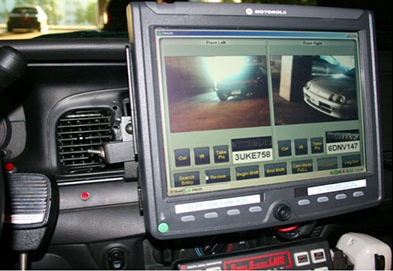On May 15, 1923, angered by the LAPD's brutal treatment of striking longshoremen, journalist and novelist Upton Sinclair appeared at a rally in San Pedro. Because the police banned all public meetings by the unionized strikers, the rally was held, with the owner's written permission, on private property prophetically named "Liberty Hill." Sinclair began reading the First Amendment.
Warning Sinclair to "cut out that Constitution stuff," the police arrested him before he finished the first three lines. Held incommunicado for 18 hours, Sinclair published a letter to the police chief after being released: "All I can say, sir, is that I intend to do what little one man can do to awake the public conscience ... I am not a giant physically ... But I have a conscience and a religious faith, and I know that our liberties were not won without suffering, and may be lost again through our cowardice."
At the invitation of the newly-formed American Civil Liberties Union in New York, Sinclair spoke at crowded meetings in Los Angeles. From those gatherings, the first local branch of the national organization was formed.
For 90 years, the ACLU of Southern California has remained true to Sinclair's courageous spirit.
Today, we are at the forefront of efforts to ensure basic equity to all public school students in California, reform our local jails and criminal justice system, provide basic fairness for immigrants, and oppose discrimination on the basis of race, religion, gender or sexual orientation.
We do so because of individuals who stand up for their rights and awaken the public conscience.
Greg Valentini fought in Afghanistan and Iraq. He served under near constant sniper and mortar fire, participated in the assault on Tora Bora and the resulting search for Osama bin Laden, and witnessed friends and civilians gruesomely killed and maimed. He received six decorations for his service. On coming home, he struggled with thoughts of suicide, developed a drug addiction, and became homeless.
Los Angeles is the homeless veterans capital of our nation -- recently as many as 8,000 homeless veterans, many suffering from PTSD and other mental disabilities, have fought to survive on our streets.
In June 2011, the ACLU filed suit on behalf of Valentini and other veterans with severe mental disabilities, many of whom could be housed at the VA campus in Brentwood, on land deeded in 1888 to create a home for disabled veterans. It housed veterans for decades, but none since the late 60s. Instead, the VA has leased parts of the campus to a car rental company for a parking lot, a hotel for a laundry, and schools for baseball fields, even as homeless veterans sleep on the street just outside its locked gates.
Claiming no responsibility to house disabled veterans, the government has unsuccessfully sought to dismiss the suit.
Jonathan Goodwin was savagely kicked and stomped by deputies after a disagreement over food while jailed awaiting trial. Although he didn't resist, Goodwin was accused of assault. When his attorney asked about prior complaints against the deputies involved, the department said there were none.
Goodwin's attorney called the ACLU and discovered complaints against the deputies. A jury acquitted him, thanks in part to this evidence.
The ACLU filed two suits on behalf of Goodwin and countless others. The first, filed in January 2012, challenged the sheriff's failure to address the longstanding pattern of deputy abuse and establish the basic parts of an accountability system -- sound use-of-force policies, adequate training, careful investigation of alleged abuse and a rigorous discipline system. Baca initially dismissed the allegations, but later admitted being "out of touch."
The second suit, filed in July 2012, challenged the sheriff's failure to maintain a searchable database of complaints against deputies, as required by law. This time, Baca implemented a system to track complaints by deputy name. The department reviewed inmate complaints going back five years, and notified local defense attorneys with pending cases so they could seek information that previously would have been undisclosed.
In October 2012, the Citizen's Commission on Jails Violence recommended rewriting the department's grossly inadequate policies on use of force, increasing the amount of deputy training to meet "industry best practices and... standards in other corrections systems," and revamping the investigation and discipline system. Baca has agreed to adopt the Commission's recommendations.
The suit remains pending to hold Baca to his promises.
Tarek Hamdi had lived in the United States for decades when he applied to become a citizen. Federal law provides that naturalization applications must be decided in six months, but Hamdi waited nine years for a decision. The federal government ultimately denied his application based on a single lawful donation he made to a charity the government later deemed a financier of terrorism.
In February 2012, the ACLU represented Hamdi in court. Not only did the judge decide that his application should have been granted, she also requested the honor of swearing him in as a citizen.
Our most precious rights only acquire meaning when individuals stand up for them. Today, when courageous people take on the Veterans Administration, the Los Angeles County Sheriff's Department, or Citizenship and Immigration Services, the ACLU ensures they have the backing they need. That's necessary in a democracy like ours committed to liberty and justice for all.
Reposted from the Huffington Post, "ACLU of Southern California: It All Began With an Arrest in 1923"
Date
Wednesday, May 15, 2013 - 11:15amFeatured image


